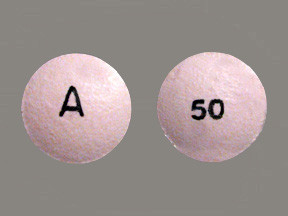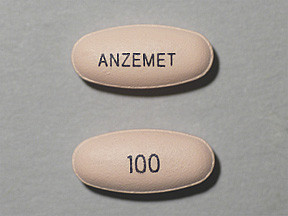DOLASETRON - ORAL
PHONETIC PRONUNCIATION: (doe-LAS-e-tron)
COMMON BRAND NAME(S): Anzemet
GENERIC NAME(S): dolasetron mesylate
Uses
USES: This medication is used to prevent nausea and vomiting caused by cancer drug treatment (chemotherapy). Dolasetron works by blocking one of the body's natural substances (serotonin) that causes vomiting. The tablet form of dolasetron should not be used to prevent nausea or vomiting after surgery due to an increased risk of serious side effects (such as QT prolongation). However, the injection form of this medication may be used after surgery. Ask your doctor for details.
How to use DOLASETRON - ORAL
HOW TO USE: Read the Patient Information Leaflet if available from your pharmacist before you start taking dolasetron and each time you get a refill. If you have any questions, ask your doctor or pharmacist. Take this medication by mouth with or without food as directed by your doctor, usually within 1 hour before the start of chemotherapy. In children, the dosage is based on age and weight. Take this medication exactly as prescribed to get the most benefit from it. Do not increase your dose or use this drug more often or for longer than prescribed. Tell your doctor if you vomit or feel nauseated.
Side Effects
Precautions
Interactions
Overdose
Images
Reviews
Faq for DOLASETRON - ORAL
Dolasetron is an oral medication used to prevent nausea and vomiting caused by chemotherapy or surgery.
Dolasetron works by blocking certain chemicals in the body that can cause nausea and vomiting.
The recommended dosage of Dolasetron varies depending on the individual and the specific condition being treated. It is important to follow the instructions provided by your healthcare provider.
Common side effects of Dolasetron may include headache, dizziness, constipation, and diarrhea. It is important to consult your doctor if you experience any severe or persistent side effects.
Dolasetron may interact with certain medications, including certain antidepressants and antiarrhythmic drugs. It is important to inform your healthcare provider about all the medications you are taking before starting Dolasetron.
Dolasetron usually starts working within 30 minutes to 2 hours after taking it. However, the exact onset of action may vary from person to person.
The safety of Dolasetron during pregnancy and breastfeeding is not well-established. It is important to consult your doctor before taking Dolasetron if you are pregnant or breastfeeding.
Dolasetron is not recommended for use in children under 2 years of age. The dosing and safety in children older than 2 years may be determined by the healthcare provider.
Dolasetron is not classified as a controlled substance.
Disclaimer
IMPORTANT: HOW TO USE THIS INFORMATION: This is a summary and does NOT have all possible information about this product. This information does not assure that this product is safe, effective, or appropriate for you. This information is not individual medical advice and does not substitute for the advice of your health care professional. Always ask your health care professional for complete information about this product and your specific health needs.


No Reviews Yet